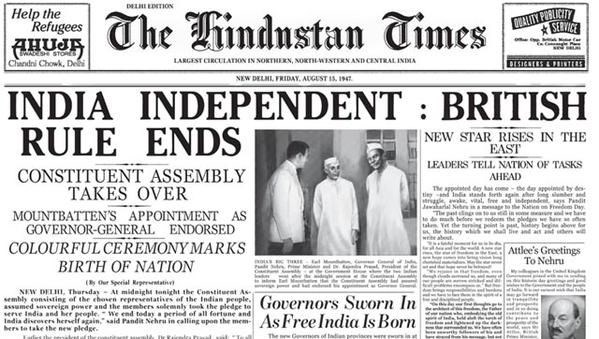
09-Jul-2025 , Updated on 8/2/2025 6:43:33 AM
Was India Truly Independent in 1947 — Or Just Politically Free?
Colonial Structures Remained Intact
The independence in the political sense in 1947 did not collapse essential colonial structures. The Indian Civil Service was left intact and elitist (meaning that) the standards of British administrative practice were maintained. Principles of law were more or less unchanged, with foundation law remaining in the Indian Penal Code and Criminal Procedure Code. The economic infrastructure such as the railways built with the purpose of extracting the resources did not fundamentally change to serve the welfare of the country. These colonial institutions that remained influential had been orienting governance, justice, and economic growth immensely over decades. This insistence shows that political freedom existed along with the strong legacies of colonialism.
Economic Sovereignty Remained Elusive
Economic sovereignty was not immediately granted in 1947 through political independence. The major economic processes were still under pressure of outside forces and colonialist rule. India had to keep its large reserves of Sterling Balance in London, much restricting its own access to the foreign exchange itself. The United Kingdom was strongly favoured in terms of trade relations that hindered the growth of the Indian industry. More importantly, British capital dominated important industries such as plantations, mining and main manufacturing industries. Protection of such foreign investments at the expense of national economic development goals was the order of the day in the policy frameworks. The result of this was that the true form of self determination in economic independence of the key resources and financial systems and strategically critical industries was not attained.
Partition's Enduring Social Trauma
One can say that the Partition of 1947 was particularly deep and enduring social trauma. There was tremendous loss because of extreme violence and forced displacement breaking communities in the subcontinent. This break put psychological wounds that run down generations. The incident deepened the sense of widespread suspicion in the communities and it destroyed millions of cultural and family bonds. The incomplete mourning, the broken identities can be said to be one of the legacies of Partition. Although there was political sovereignty, the fabric of the society was violently ripped to the shreds. The resulting lines of distrust and alienation persist. Constant mental stress, generational trauma, and repeated community conflict are the direct results of Partition, proving it to be a lasting social trauma.
Cultural Hegemony Continued Unchallenged
In 1947 the political independence did not destroy colonial cultural hegemony. Education systems in the West remained in place and English remained an administrative language and the language of elitism. European values and beauty remained idealized and institutionalized across the world in disadvantage to the indigenous knowledge, local vernaculars, and non-western culture. This unopposed hegemony made national identity and intellectual life to be formed according to colonially defined paradigms. These established structures could not be removed as a result of political sovereignty only, and that showed the difference between political freedom and cultural autonomy.
Liberation Versus True Self-Determination
It was in 1947 that political liberation was realized with the colonial rule being removed. Nevertheless, being a sovereign state was not enough to have a genuine self-determination. The Partition caused extreme human sufferings, which was a fundamental clash with any idea of self-rule of everyone. Self-determination in economics was limited, and certain major institutions and financial links continued to be influenced by external factors at the very beginning. Moreover, the unified territorial sovereignty was not an immediate achievement, and there had to be a complicated incorporation of plenty of princely states. Political freedom was established but the complete self-determination of which includes complete control over the economy, complete territorial sovereignty and the safety of all citizens was a major challenge that had to be met immediately after power change.

Content Writer
Hi, I’m Meet Patel, a B.Com graduate and passionate content writer skilled in crafting engaging, impactful content for blogs, social media, and marketing.
Comments
Join Our Newsletter
Subscribe to our newsletter to receive emails about new views posts, releases and updates.
Copyright 2010 - 2026 MindStick Software Pvt. Ltd. All Rights Reserved Privacy Policy | Terms & Conditions | Cookie Policy